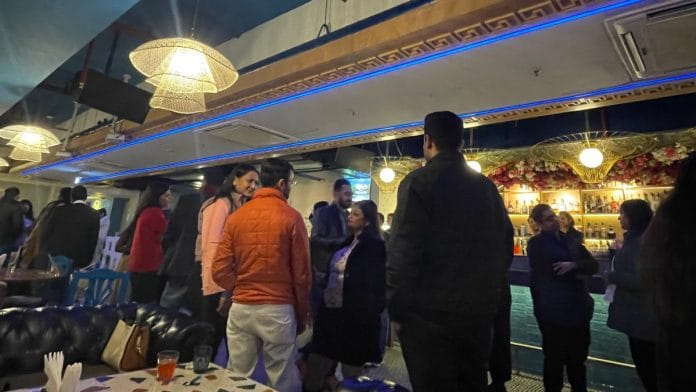Gurugram: A group of nearly 50 people, almost evenly split between men and women, gather in a circle at a soft-lit restro-bar in Gurugram’s trendy CyberHub, exchanging quick glances and coy smiles. Their host pairs each person with their neighbour to the left and tells them they have five minutes to ask each other questions and discover common ground.
The setup looks like a party or a corporate ice-breaking session, but the goal is not to pass the time or force team bonding. It’s more profound: to find love. In the wilderness of modern dating, apps such as Bumble, Tinder, Hinge, QuackQuack, and Happn are the guides, but many are left lost and disillusioned by the endless swipes, ageism, skewed gender ratio, mismatched expectations, scams, and dead-ends. This breezy Saturday night, the modern matchmaking ‘mixer’ at CyberHub offers an exciting new alternative—old-fashioned romance. In this singles’ meet-and-greet, everyone is hoping to get their money’s worth in flirting and banter. Sparks flying across the room.
When the five minutes are up, the host calls out pairs one by one, inviting them to share at least one interesting thing they found in common. One pair announces that they both spent their childhood in Pune, but their paths crossed this night for the first time. Another pair shares that the woman works in education—just like the man’s mother, a schoolteacher. For a few moments, tenuous coincidences morph into serendipity, and liking the same flavour of ice-cream takes on the hue of destiny. Amid cheers and hoots, some participants paste “I like you” stickers on each other. Others seem embarrassed and shy, but they stay.
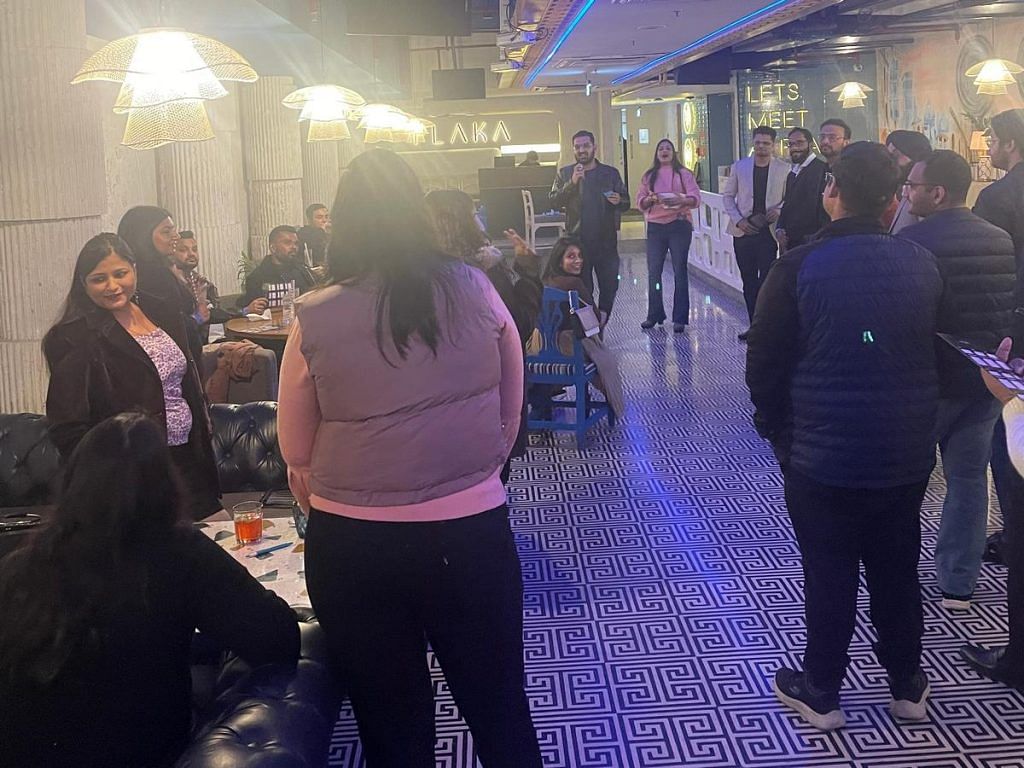
After a series of games, the men and women are left free to mingle over food and drinks. Among them, sporting a purple dress and a dazzling solitaire on her ring finger, is Priyanka Sood. For her, finding love is serious business. The 38-year-old, single since her partner’s death in 2019, tried meeting potential romantic companions through work, social gatherings, and other channels before graduating to dating apps like QuackQuack and Tinder last year. But her “five to six months” of scrolling have been disappointing.
“After joining the apps, I met a guy who was very nice, but I found out he’s married. I wanted something serious, not an open-ended relationship that’d lead to nothing,” she sighs. Another promising prospect also made it clear he wasn’t looking for a long-term commitment. “He’s 36 and didn’t want anything serious… I mean, at that age also if you’re not ready, then when?”
She’s not the only one who is exasperated with apps. Fellow mixer attendee, 25-year-old Gursehaj (asking to only use his first name), claims to have spent “all of the past two years aimlessly looking on all the apps” to no avail.
The popularity of [dating] apps is, in fact, increasing, but the satisfaction levels or experiences of people have become much worse
-Geetika Arora, co-founder of Prem-a-Culture
According to data aggegator Statista.com, India was the second-largest market for dating apps, generating $323 million in revenue and trailing only the United States. But dating apps often feel like a game of roulette with bad odds. On the other extreme, matches and meetings arranged by family members can be a pressure valve.
Mixers, therefore, promise a happy medium. They provide an in-person dating pool curated by organisers while retaining the thrill of discovery. There’s the convenience of online registration, but also the charm of an offline social interaction, even if it’s stage-managed.
For Sood and Gursehaj, the Cyber Hub soiree, organised by the dating platform Let’s Socialise, is their first foray into singles’ mixers. And a mix it is. The guests range in age from their 20s to late 40s, with engineers and consultants rubbing shoulders with fitness trainers and musicians. But all are searching for a better way to navigate the perilous world of modern dating and love.
And now several event organisers are setting up such gatherings across the country, from metros to Tier-II cities. Let’s Socialise alone has held more than 70 such events across Delhi-NCR, Jaipur, Chandigarh, Indore, Bengaluru, and other locations since its inception in 2022.
Meanwhile, even as Sood keeps up her search, she buoys herself with the mantra of self-love. “I still feel I am perfect,” the Tata Consulting Services associate says, flashing her diamond ring. “Not everyone can afford a solitaire! I gifted myself this ring for my birthday.” Sood has set a deadline for herself. She plans to get married to herself at the Neemrana Fort resort on her 40th birthday “if I don’t find love by then”.
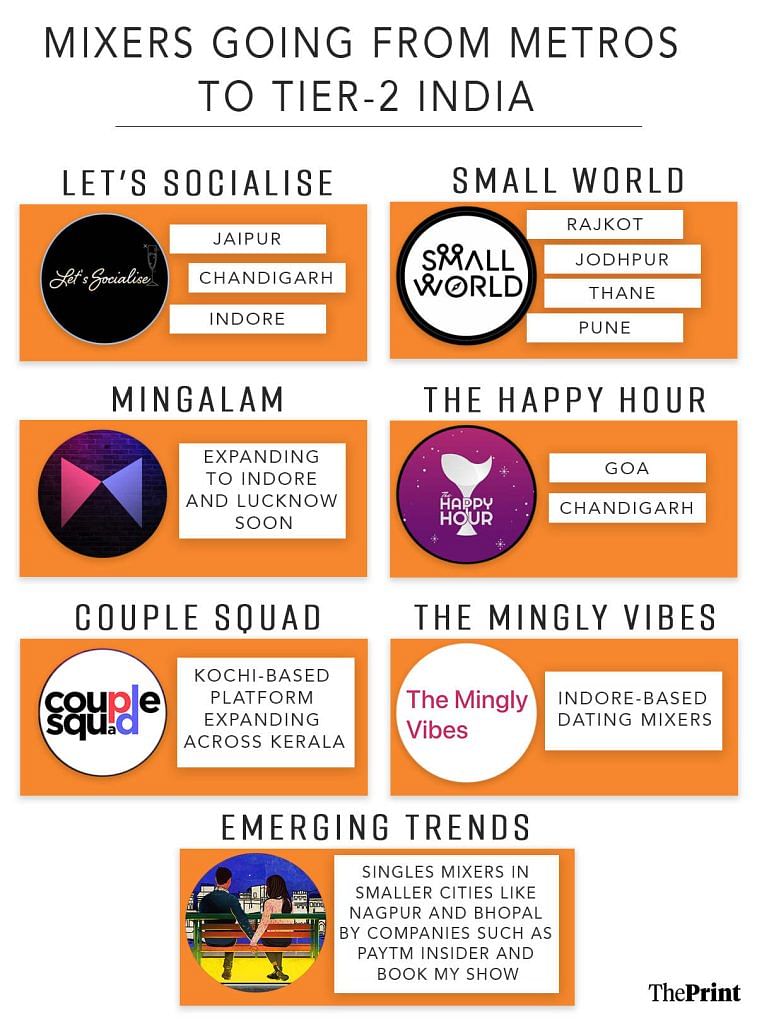
Algorithms to ‘authentic’ attraction
When dating apps first burst onto the Indian scene in 2014 with the launch of Tinder, urban youth were like kids in a candy store. The sudden access to a vast pool of potential partners, just a swipe away, offered the tantalising prospect of finding love, or even something more fleeting, within an easy radius.
On the face of it, this popularity shows no signs of waning. Indian consumers spent a staggering $9.9 million (around Rs 82 crore) on dating and friendship apps in 2022, more than double the previous year’s amount and well above the global average, according to a study by mobile app analytics platform App Annie.
But popularity doesn’t necessarily mean user-happiness. A decade of swiping, scrolling, and the seemingly limitless array of options has caused fatigue to set in. This very abundance of choices has led many to realise that the model of online dating is broken.
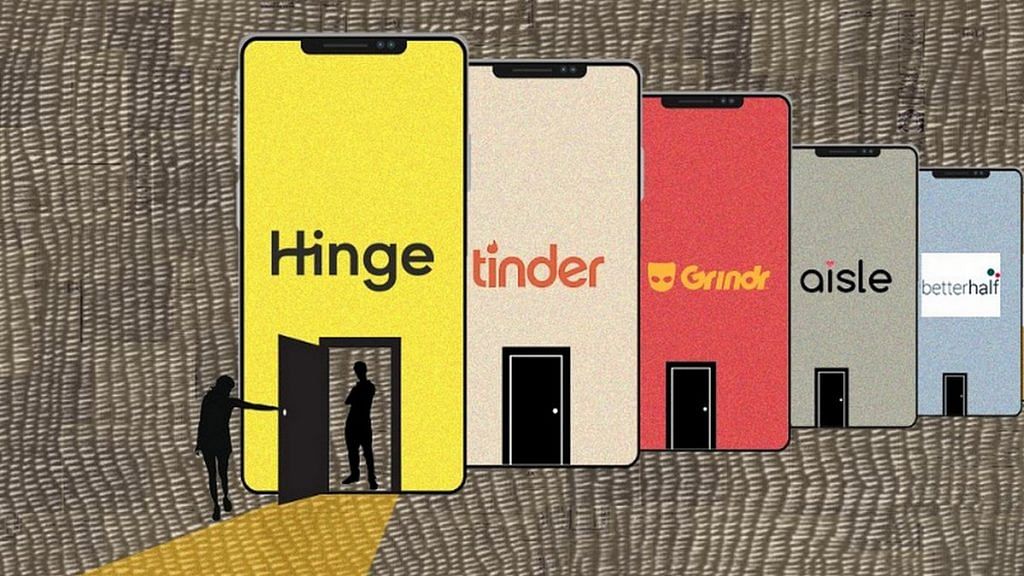
Many users now yearn for authentic attraction and a return to the ‘meet-touch-feel’ approach to falling in love. In response to this demand, speed dating took a leap in India some years ago, but this too follows a buffet-style format with a ticking stopwatch. Others desire slower, more organic experiences, and this is where mixers come in.
“I think the popularity of these apps is, in fact, increasing, but the satisfaction levels or experiences of people have become much worse,” says Geetika Arora, co-founder of Prem-a-Culture, a platform founded after the second wave of Covid-19 in 2021 to facilitate more conscious, slower dating.
“For most men, [app-based dating] is a space where they have to put in money, but still don’t get enough matches. For women, it’s a space of getting too many invitations, swiping and browsing through too large a spectrum of men,” Arora elaborates. In a 2018 survey, the Indian dating app Woo found that women made up only 26 per cent of dating app users in India.
Even after a match happens, Arora adds, converting it into just a conversation takes considerable time and energy, leave alone progressing to a meeting or a relationship.
Prem-a-Culture has organised close to 100 events, meet-ups, and workshops across Indian metros, but their work has expanded beyond dating to include programmes for personal growth and emotional readiness for love.
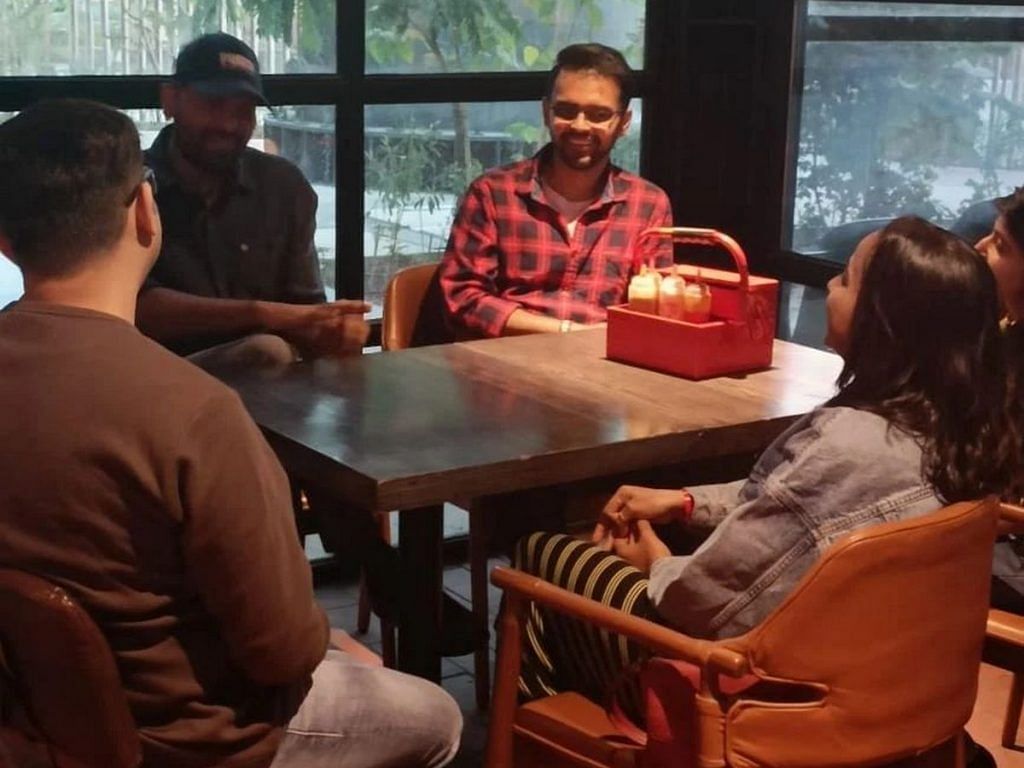
“We’ve started doing workshops for all kinds of people. For instance, we did a Valentine’s workshop in Bangalore that was about self-love, open to all age groups, sexualities, and parents too,” Arora says. “We’re also doing workshops on how to date better, on healthy flirting and so on.”
While meeting strangers may be “easier than ever before”, people caught in the scrolling cycle “are not able to forge genuine connections,” she points out.
A deep sense of unfulfillment with apps is not just an Indian phenomenon. On 14 February, for instance, six men in the US filed a lawsuit against Match, the parent company of Tinder, Hinge, and other dating apps, accusing it of having a “predatory” business model. They also claimed that dating apps are designed to get users “addicted” by locking them into a “perpetual pay-to-play loop”, not unlike gaming platforms. Many, having entrusted love to algorithms, are now realising they might just have sabotaged the quest.
Meeting face-to-face mitigates barriers such as English proficiency and allows connections between people who might not be able to relate to each other merely through the written word.
Love in the time of loneliness
In the middle of the animated chatter and peals of flirtatious laughter at the Let’s Socialise mixer in CyberHub, Gursehaj carefully selects a few snacks and retreats into a corner. A newcomer to Gurugram from Chandigarh, he is a “very introverted person” by his own admission and “struggled” to connect with women through dating apps.
“The thing is, you can’t actually get to know anyone genuinely [through apps] since it’s largely based on a person’s profile and looks. It’s about creating this image, and it’s actually difficult to know what is real, who is genuine,” he says. “This is my first mixer, but there’s a big difference when you first meet people in real-life.”
We’ve stopped casual interactions with individuals, like genuine small-talk, which is also very essential to feeling good,” she says. “That’s why I think [mixers are] a good trend because they are not forced on individuals.
-Sneha Sharma, consultant psychiatrist
In-person meetings, as Gursehaj suggests, offer a quicker way to gauge chemistry and compatibility than digital profiles. They also avoid the pitfalls of online interactions, where inaccurate photos and self-presentation can lead to disappointment in person. And while meeting new people organically during work or social events can be awkward and uncertain, mixers address these challenges too.
“Singles mixers and offline dating events provide a structured environment for meeting new people because the facilitators use icebreakers, activities, facilitated conversations, often making it easier for attendees to initiate connections” says therapist and relationships counsellor Ruchi Ruuh.
She adds that these events aren’t just for finding romantic connections, but also for building adult friendships—which can be particularly difficult for people who have moved to a new city or are just naturally shy.
This, in fact, was the impetus behind Let’s Socialise, founded by romance novelist Ravinder Singh and marketing analyst Siddharth Bhatia in February after the third wave of Covid in February 2022— when the world was ready to brave human interaction again.
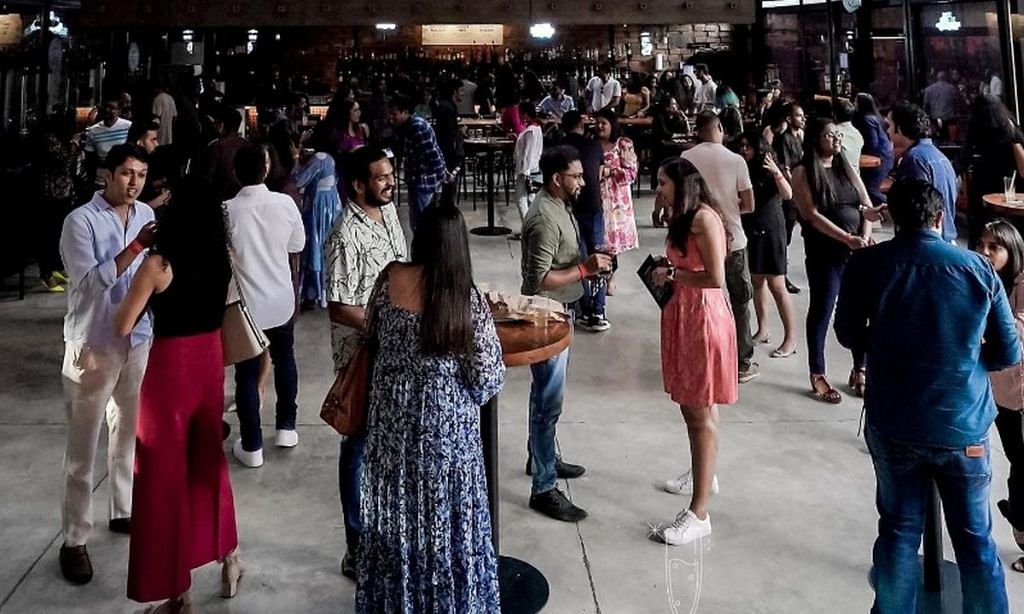
“I’m single, and figured out Covid was a very difficult time for me,” says Singh, 42. “Covid made us single people feel lonelier! Some turned into pet persons, because it’s an innate human need to seek warmth— but I’m not even a pet-person. I didn’t want to get married, but that doesn’t mean one can’t find avenues to meet people.”
Singh’s story sounds all-too-familiar in a day and age of rising adult loneliness, which the World Health Organization has recognised as a “serious threat” to health and wellness, linked to a higher risk of stroke, anxiety, dementia, depression, and suicide. It’s a mental health epidemic, exacerbated by the superficial connections of social media and dating apps—a world of curated feeds and shallow chats that often leave people feeling more isolated.
Relying too much on this illusory realm can lead to “burnout”, according to Dr Manoj Kumar Sharma, a clinical psychologist and coordinator of the ‘Services for Healthy Use of Technology’ (SHUT Clinic) at Bengaluru’s National Institute of Mental Health & Neuro Sciences (NIMHANS). Sharma is even exploring conducting a study on the issue. “We are going to start this work,” he says. “We conceptualised it after a case of someone who took help for internet use. This young professional was living alone and got into various dating platforms to find a relationship. He started ditching office work and meetings with family in the search of matches online.”
When you’re in your early or mid-20s, you are not sure of what you want and naturally not that serious. The idea was to build a platform for those who’re older and looking for something serious
-Raunak Joneja, founder of Thirty Plus
There is some unlearning to be done. Post-Covid, people have become “too comfortable” with maintaining various relationships online, according to Dr Sneha Sharma, a consultant psychiatrist and de-addiction specialist who says she has treated several people who are suffering due to loneliness.
“We’ve stopped casual interactions with individuals, like genuine small-talk, which is also very essential to feeling good,” she says. “That’s why I think [mixers are] a good trend because they are not forced on individuals. People are choosing to come together and see if they have shared interests.”
The past few years have witnessed a resurgence in community-building activities among adults. These range from initiatives like group reading sessions in parks and food or heritage walks to women-led movements to reclaim public spaces. The rise of mixers reflects this trend. “These mixers bring like-minded individuals together,” says Ruuh. “For example, a history walk in the museum is a sure shot way of meeting someone who appreciates arts and aesthetics.”
For Singh, the culture of shame attached to confronting adult loneliness pushed him to launch Let’s Socialise. “I asked myself, what if there is a club or restaurant full of single people and you tell them that they are required to reach out to every other person here? And not only that, they have willingly paid to undertake this activity?” he says. Singh claims that he is trying to convince singles that socialising is their “dharam” (duty) and he aims to create spaces where approaching others is encouraged, not seen as crossing a boundary.
Also Read: Gurugram men are quitting dating apps, alcohol, hiring lawyers. A woman on Bumble did this
A ‘safer’ option
Plunging into online dating means confronting a whole new world of emotional, financial, and physical risks, including crude sexual solicitations, ghosting, being stood up, and, more seriously, scams and safety concerns. Those who are burned by such experiences are less likely to take a chance again.
Chirag, a resident of Delhi’s Pitampura, claims he was swindled by a Bumble date, which soured his perception of these platforms.
“I matched with a woman who seemed genuine and nice, with a verified profile. After we exchanged hi-hellos, she told me to meet her at a cafe in Vikaspuri for the first time, and she shared the location on WhatsApp,” says Chirag, who is in his early 30s and asked for his last name to be withheld.
The date went well enough and, so, Chirag did not raise a fuss when he received a somewhat unusual bill. “I paid a kachcha bill [without any GST or invoice] of over Rs 8,000 for something that shouldn’t have cost us that much,” he says. “And after that meeting, I was never able to trace her again.”
Shaken by the experience, Chirag sought alternatives and discovered mixers.
“I prefer to attend such events now. It’s also a great way to forge friendships. I have my own construction business, so making new friends after school and college has been difficult,” he adds.
For Nazia Kausar (name changed upon request), an academic from Mumbai now living in London, a sense of alienation and disillusionment with dating apps led her to attend a ‘milkshake mixer’ organised by Muzz, an app-based platform for Muslims seeking not dates but marriage prospects.
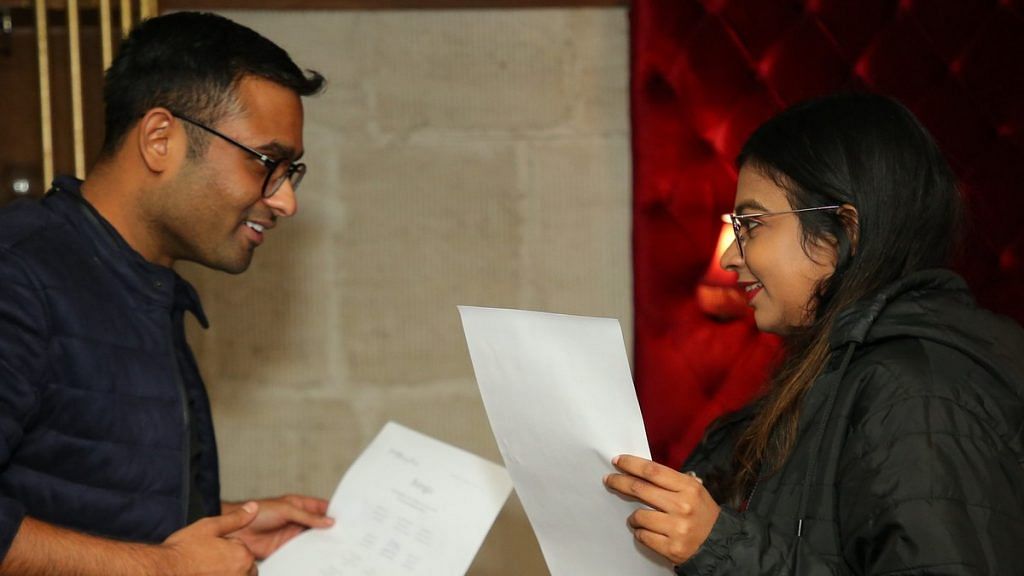
“To be honest, I don’t believe in religion and it was very awkward, but they were offering free milkshakes! But by the end of it, I did meet someone from a similar background who was also not religious. We went for dinner and drinks thereafter and had a great laugh and good time,” she says excitedly.
While Kausar is now in a relationship with someone else she met offline, she still recognises the value of mixers for connecting with new people and expanding social circles.
Meeting face-to-face mitigates barriers such as English proficiency and allows connections between people who might not be able to relate to each other merely through the written word.
“On apps, the entire dependence is on words and language,” Arora says. “There can be a person who’s very nice but may not know much English, so you wouldn’t maybe connect online. On the other hand, if you meet them you might be able to connect with them in a different language.”
Ravinder Singh from Let’s Socialise says that their events, including those held in smaller cities, are increasingly attracting attendees in their late 30s and early 40s. Now, he’s even considering hosting mixers for people above 60.
More age groups in the mix
People seeking love in their late 30s, 40s, 50s, and beyond are often invisiblised in a youth-obsessed culture, with outdated notions of desire and desirability lingering around age. Until a couple of years ago, even Tinder followed age-based pricing where 18- to 29-year-olds were charged less than their older counterparts.
But the issue of ageism runs deeper, especially in India. The prevailing assumption is that dating is solely for those in their 20s and that everyone “settles down” by 30. This mindset overlooks that many people are hungry for romance well into middle age and beyond, whether they are never-married or newly single.
Event organisers are finally recognising this untapped potential and tailoring mixers for this crowd, especially “older millennials”. One such platform is Thirty Plus, founded by Mumbai-based Raunak Joneja and Berwin Dhanjal in 2022. The tagline: “Offline love for singles above 30.”
Joneja, a former software developer at Shaadi.com, says their own experiences propelled them to launch the venture. “Both of us were single and wanted to meet people. When you’re in your early or mid-20s, you are not sure of what you want and naturally not that serious. So, the idea was to build a platform for those who’re older and looking for something serious,” he says.
A vetting process ensures genuine interest among attendees. “We just cold-call people, try to understand why they’re coming and what they’re looking for from these events, and then we send them the link to pay and confirm their presence,” Joneja says.
In smaller towns, there is more stigma around attending such an event, because nobody wants their family or even friends to know they’re willingly going out to seek dates like this
-Ravinder Singh, founder, Let’s Socialise
Many people at their mixers, he adds, talk about dashed expectations and disappointing experiences with apps. “These events allow you to meet a big pool of actually interested people, at a single venue.”
Ravinder Singh from Let’s Socialise also highlights that their events, including those held in smaller cities, are increasingly attracting attendees in their late 30s and early 40s. Now, he’s even considering hosting mixers for people above 60.
The format appeals to those seeking a more efficient and focused approach to dating, he says. “I’m not against apps,” he clarifies. “I think they can coexist. But each event will give you just 30-40 people, whereas on the apps there are a thousand options. The abundance makes you take it for-granted, ki chalo yeh bhi hai woh bhi hai and you get distracted. Only people who are very serious come to an event, it involves showing up.”
Also Read: Small town India is warming up to online dating. Instagram, Facebook new romance gateways
New formats, old problems
Dating in India is often a furtive affair, conducted in the dimly lit corners of restaurants. In contrast, mixers entail meeting many people, with the purpose spelled out. There’s always a small possibility of encountering a familiar face, like a neighbour or cousin.
In smaller cities and towns, especially, this is a problem. Platforms like Let’s Socialise, Mingalam, The Happy Hours, and others, inspired by their success in the metros, are now expanding to cities like Jaipur, Lucknow, and Indore. However, their target audience remains hesitant.
“In smaller towns, there is more stigma around attending such an event, because nobody wants their family or even friends to know they’re willingly going out to seek dates like this,” Singh says. At a recent mixer in Jaipur, attendees specifically requested that Singh not upload photos of them during the event, fearing their family members on Instagram might recognise them.
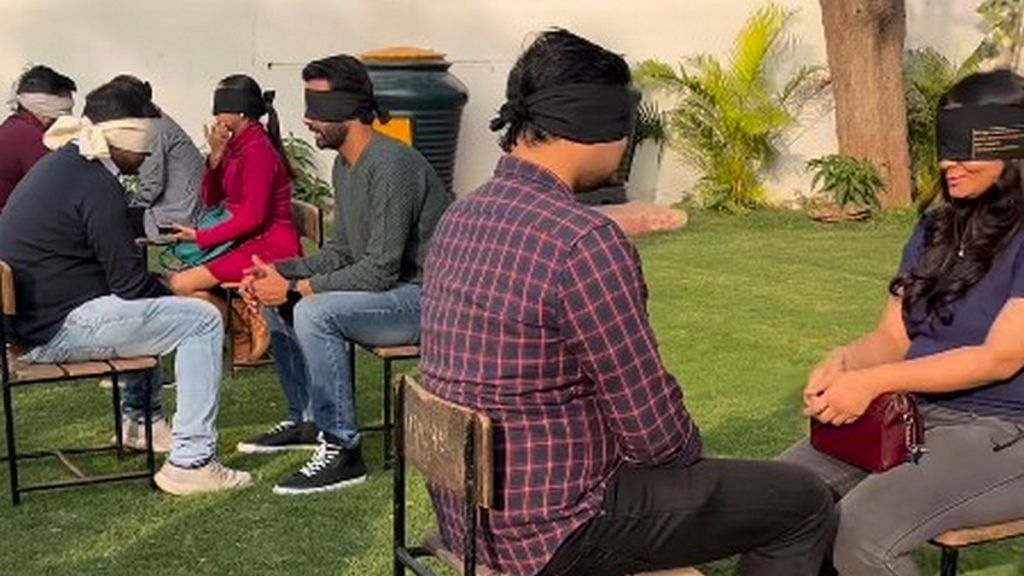
Another challenge is making these events more inclusive, given that they have mostly been targeted at straight, cisgender people so far. While LGBT-led groups and community organisations like the Gaysi Family and Delhi Queer Spaces have been organising offline parties and queer mixers for some time, platforms like Prem-a-Culture, Let’s Socialise, and Mingalam are also planning to cater to a more diverse range of singles.
Meanwhile, the competition is heating up. Dating apps like Tinder, Bumble, and Hinge are adding offline events to their repertoire in an attempt to diversify user experiences and address insecurities about online dating.
But offline events don’t guarantee commitment and lasting relationships either. Arora argues that the core issue lies within the very nature of contemporary relationships. “We live in a very individualised world. There is no tangible reward for being a good friend, daughter, or partner. But there are rewards for doing well academically, or earning more,” she says. “There’s no incentivisation toward having better relationships. All the cultural structures around us keep telling us to be more individualistic rather than community oriented.”
Despite the myriad challenges and uncertainties in the modern dating scene, for singles like Priyanka Sood, stepping away from dating apps represents a path towards more authentic connections.
“I’m looking for something that’s meaningful, not just passing my time,” she says. “The real problem is that too many people are just using these platforms for validation and time-pass. But haven’t they heard of hobbies? If you want to do timepass, then please take up hobbies, learn some skills, but not this.”
(Edited by Asavari Singh)



